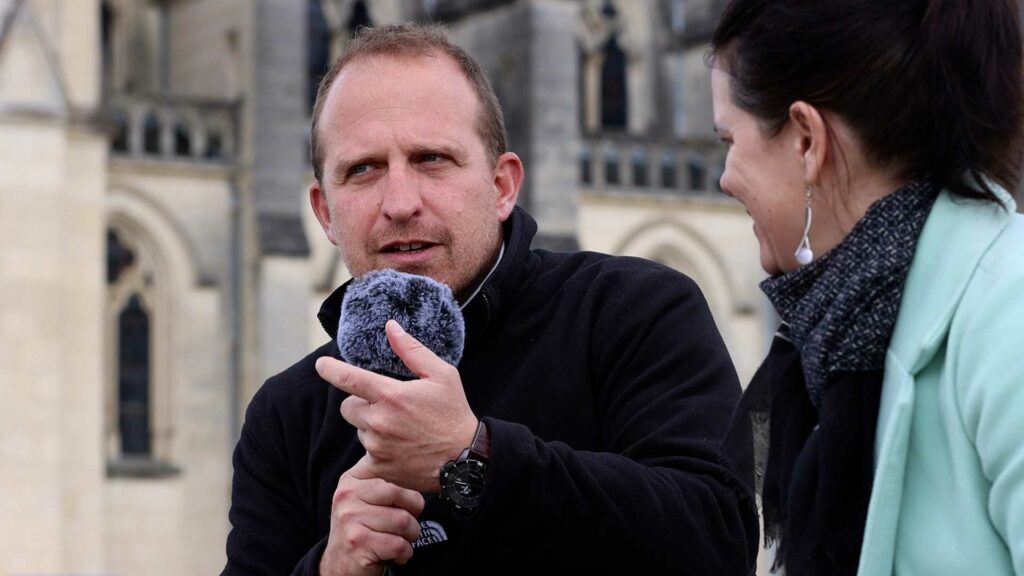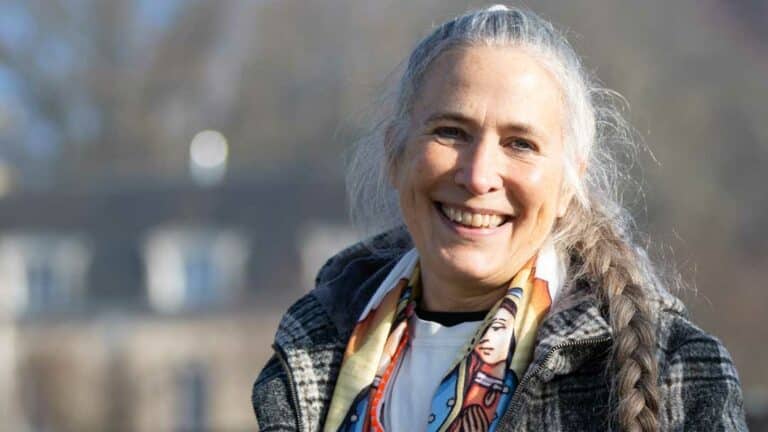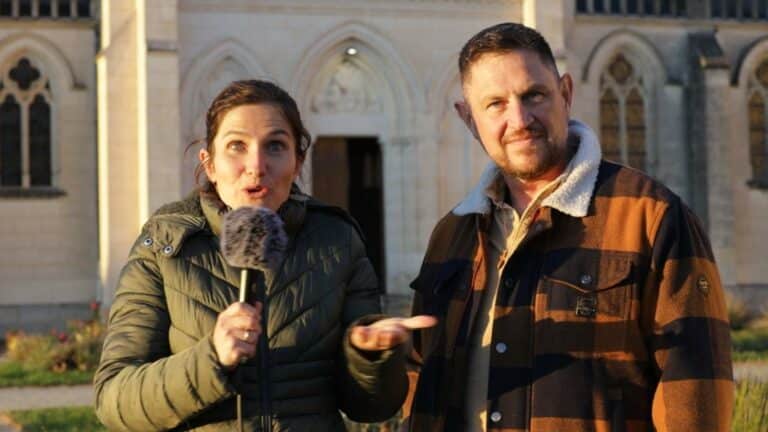One of the lyrics of a song by Michel Berger goes like this: “Je m’en irai courir dans le paradis blanc, loin des regards de haine et des combats de sang” [I will go run across the white paradise, far from hateful gazes and bloody fighting]. An idyllic vision of peace and shared joy often illustrates this vague notion of paradise. Each and every one of us seeks to give color to this haven of peace that everyone dreams of, but no one knows what it really is. Don Paul Denizot, rector of the Notre-Dame de Montligeon sanctuary, gives us an insight of what paradise is.
Is paradise a myth or is it real?
Heaven is a reality of faith. The Catholic Church believes in the eternal life that Jesus came to give us. It is at once a promise, an object of hope and a truth of faith. Man was made for Heaven.
But what is heaven exactly? First and foremost, it’s a promise that fulfills a deep desire in the human heart. You recalled this by quoting the song by Michel Berger. Generally speaking, there’s an aspiration in man, an expectation of happiness, which is never fulfilled.
The hankering for happiness, deeply rooted in man’s heart, is a starting point. In my view, it is impossible that this desire may remain unsatisfied. Otherwise, that would make man an absurdity, a monster even.
What is paradise like?
It’s interesting to see how different cultures have sought to represent paradise. Often, they’ve imagined this world… only better. For example, in some African cultures, there is the idea of the ancestors’ village. It is the same village, but more beautiful. In Asia too, we find similar representations: the deceased are offered beautiful houses, sometimes even a second home that they could rent to another dead member of the family.
The same thing can be observed in modern culture. In the movie Les Secrets professionnels du docteur Apfelglück, paradise is recreated as a suburb of bungalows where everyone is dressed in white, is kind and smiling… with something a bit unbearable about them.
In Islam, paradise is described in very down-to-earth terms, as a garden of delight. Jews and Christians use images: the mountain of the Lord, the feast of choice pieces of meat and heady wines, the wedding banquet, the garden, resting with God… But this language remains symbolic, human ways of describing a spiritual reality that is completely beyond us.
As St. Paul says: “What no eye has seen, what no ear has heard, what no human mind has conceived, these are the things God has prepared for those he loves.” (1 Cor 2:9)
The promise of faith is not an everlasting life but a full life, a life accomplished for ever. Even if we sense what it could be like in the great times of our lives, we cannot possibly conceive it.
Take your greatest joys — I mean, the real ones, the joys of love, of deep relationships — and multiply them a billion times… and you’ll still be way off the mark.
Can you get bored in paradise?
No, and that’s precisely what is hard to grasp. Revelation gives us images of both activity and rest. We ask in prayer: “Give them eternal rest”, but beware, this rest is not a kip! Rather, eternal life is restful activity, or active rest.
Let’s take an example: a good meal with friends, a barbecue, good wine, prime rib… all this is a pretext. What really counts is the joy of being together. Rest comes from friendship and shared love.
It’s also like those silent moments with a loved one who looks at us and whom we look at… There’s something great going on in this exchange. It’s at once simple, active, alive – and deeply restful, the peace of love.
Is paradise corporeal or spiritual?
Heaven is first and foremost a spiritual reality – seeing God face to face. This vision brings profound bliss to the soul and heart.
But Christians also believe in the resurrection of the flesh, therefore that this joy will not only be spiritual, but also felt in the body at the resurrection.
The body will share in this joy. It will see colors it has never seen before, it will perceive sounds – angelic songs, no doubt – it has never heard before. There will be a kind of joy for the body, for the transfigured body.
So yes indeed, the joy of heaven will be both spiritual and bodily, a joy fully embodied.
Can Paradise be lost?
In fact, no. Eternal life is a stable state that can never be lost. It is the peaceful, total and definitive possession of love.
There is no more pain, no more fear, no more anguish. All is joy. The happiness of a relationship with God ‘is definitive.
Can you still be mean in heaven?
Evil does no longer exist in heaven, there is not a glimpse of hatred, wickedness or sin. It has all been purified, either in the sanctity of life, or in martyrdom, or in purgatory time.
In the end, paradise means being what we are meant to be: holy, immaculate beings created in the image of God.
Paradise, heaven, the Kingdom of God: what are the differences?
These are different words for the same thing. The word paradise comes from the Persian language: it suggests a garden as well as a place of closeness to God. Heaven is a way of describing the transcendence of this gift from God. The Bible also uses the phrase ‘Kingdom of God’. This kingdom is Jesus.
“Eternal life is that they know you, the only true God, and him whom you have sent, Jesus Christ.”
We come across another term – eternal life. St. John writes in his Gospel: “Eternal life is that they know you, the only true God, and him whom you have sent, Jesus Christ.” (John 17:3) Eternal life is a person, Jesus, who conveys God’s life to us.
What about non-Christians, can they enter heaven?
Christ has sent us to proclaim the Gospel:
“Whoever believes and is baptized will be saved; whoever refuses to believe will be condemned.”
The Church however has always believed that God wants to save all men. And He reserves the means of this salvation, means that only He knows. A man who, through no fault of his own, would have lived in ignorance of the Gospel, but with a righteous heart, seeking to do good… already bears an implicit desire for baptism within him.
“He who believes and is baptized will be saved; he who refuses to believe will be condemned.”
Who enters heaven?
Heaven is open to all. It is not a club for the perfect, but is only for those who have accepted the salvation offered by Jesus Christ. Indeed, the first saint to enter paradise was the Good Thief – a sinner who said to Jesus, “Remember me when you are in your Kingdom.” We know Jesus’ reply: “Today you will be with me in paradise.”
Paradise is also the communion of those who have recognized Jesus in the poor.
From a certain perspective, getting into heaven is easy. All you have to do is admit you’re poor and a sinner, and ask the Lord for his paradise. Yet at the same time, it’s very demanding, because you have to be humble and accept to be saved by Jesus Christ.
Let’s remember that eternal life, what we expect, is a person – Jesus Christ, who loves me and saves me.




